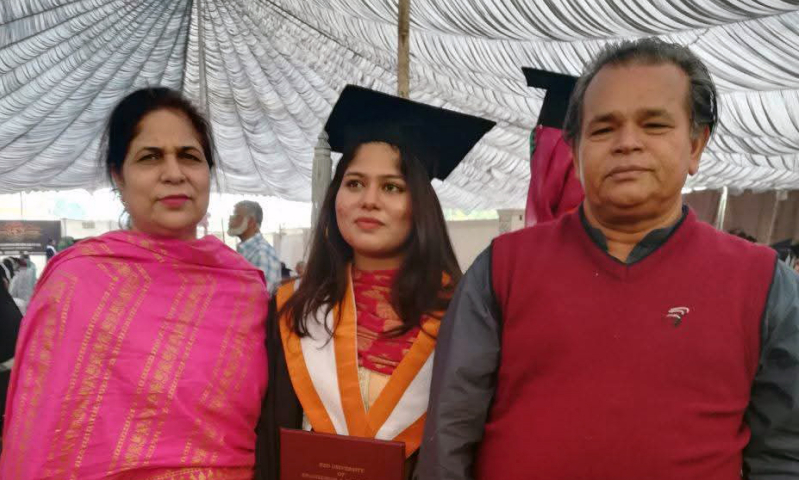
This Christmas has brought extraordinary joy to the family of Azam Mairaj as his daughter is the only female among five Christians who have cleared a competitive written examination especially conducted to fill 104 vacant positions in the federal government to fulfill the five percent minority quota.
The 26-year-old’s educational journey is a unique story of hard work, determination and courage. Belonging to a middle-class Christian family in Karachi, the largest city in Pakistan, Aroosa Azam constantly struggled to fulfill her dreams. An electronics engineering degree-holder from NED University in Karachi, Aroosa is the daughter of Azam Mairaj, a real estate businessman and a social scientist who has authored 17 books.
Attributing her success to her perseverance and determination, Aroosa said that this was her fourth attempt to clear the Central Superior Services (CSS) examination. She had failed in three previous attempts, but she did not give up.
“When I failed the CSS exams for the third time in 2023, instead of feeling disappointed, I gained confidence, courage, strength, and conviction,” she told Christian Daily International.
The government's announcement of holding a special CSS exam for minorities gave Aroosa new hope that perhaps this opportunity was for her. “I have dedicated seven years of my life to see this day. There were moments when I would feel a bit demoralized but my faith in God and support of my family and friends motivated me to keep going on,” she said.
Inspired by the life of Samuel Martin Burke, a Christian diplomat and architect of Pakistan’s foreign policy, Aroosa said she wanted to join the Foreign Services of Pakistan.
“My second preference is the Pakistan Administrative Services,” said Aroosa, who is currently working as an Associate Engineer in the Cyber Security Lab at NED University.
Commenting on his daughter’s remarkable feat, Azam Mairaj said that while he was very happy for Aroosa’s success, he was concerned by the overall performance of the other Christian candidates.
“It saddens me to see that only five Christians have passed the special test. Our community takes pride in its legacy of promoting education in the subcontinent, but this result calls for a serious introspection into the reasons why our educational institutions have failed to produce competent candidates,” he told Christian Daily International.
Mairaj, who launched a social awareness campaign for religious minorities called Identity Movement in 2020, said that he wanted to see more Christians and members of other marginalized communities competing for government jobs.
He blames the historic lack of progress “of ordinary Christians and the lack of vision and commitment of our socio-political and church leaders is a major reason for our remaining out of the national mainstream,” he said, stressing that “there’s a need to think a little unconventionally.”
Special exam to fill up seats for minority and women candidates
For the first time in Pakistan’s history, the Federal Public Service Commission (FPSC) held a special CSS examination on Oct 12, 2023, for members of minority communities and women candidates to fill the seats reserved for them that had remained vacant for years.
Though minority and women candidates have participated in the CSS exams, there were not enough candidates to fill the seats reserved against these quotas, which meant that only around one to three reserved posts were filled in each exam.
According to the result of the FPSC’s Special CSS Written Examination 2023 announced on Dec. 13, 2024, only 519 candidates out of 15,245 who appeared in the examination successfully passed the crucial phase of selection. Only 11 minority candidates – 5 Christian and 6 Hindus – have cleared the written examination. The successful candidates will now undergo a medical examination, psychological assessment, and interview. Final merit will be determined after the interview process.
Although a quota has been mentioned in Pakistan’s Constitution since 1973, the rules were not made until a decade and a half ago. The quota for women started in 2007 and for minorities in 2009, yet the reserved seats remained largely unfulfilled since then.
The first step to address the historic issue was taken in 2022 when Dr Shoaib Suddle, the one-man commission on minorities established on the orders of the Supreme Court of Pakistan, ordered a census of the vacant posts reserved for minorities at the federal level and in all the four provinces. He directed the establishment secretary to report about the vacant slots in the Centre and to the chief secretaries in the provinces. The result was shocking even for Dr Suddle, a reputed retired officer of police service.
It turned out that 95 percent of jobs given to the minorities went to Christians and they were limited to the role of sweepers and janitors. In total, more than 33,000 posts allocated to minorities from grade 1 to grade 17 had been lying vacant for years and hardly any effort was made to fill them despite the large number of unemployed youth in the country.
Dr Suddle, whose commission has already done laudable work in cleansing school curriculums from hate against minorities and recovering occupied lands of Evacuee Trust Property Board worth billions of Pakistani rupees, decided to do the needful for helping minorities get their due share in job quota.
He directed the FPSC and provincial commissions to fill in the slots allocated through competitive exams while issuing similar orders to autonomous institutions that have quotas for minorities. The FPSC went a step further by also including women to fill in the slots vacant against the reserved quota of 10 percent. Consequently, online applications opened where 34,334 candidates applied and 21,920 qualified the screening test. Seats reserved for quotas of different provinces were included as well.
As many as 1,263 minority candidates and 7,510 women candidates cleared the screening test whereas 14,410 candidates who applied against quotas of different provinces qualified for the written exam, which was held on Oct 12, 2023.
According to a census conducted by the Punjab Public Service Commission, at least 61% of Punjab’s gazetted seats reserved for minorities remain unfilled, however, with a majority found in Punjab’s Higher Education: Of the 122 total posts, only 46 are filled while 76 remain vacant.
Police stand second with 83 posts, where 27 are filled and 56 remain vacant. Primary & secondary healthcare is at third position with 28 occupied and 45 vacant for the assigned 73 slots. In total, there are 423 gazetted posts for the minorities in Punjab with 259 remaining vacant.





